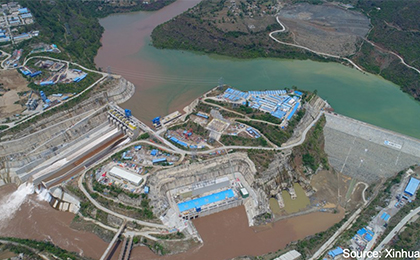

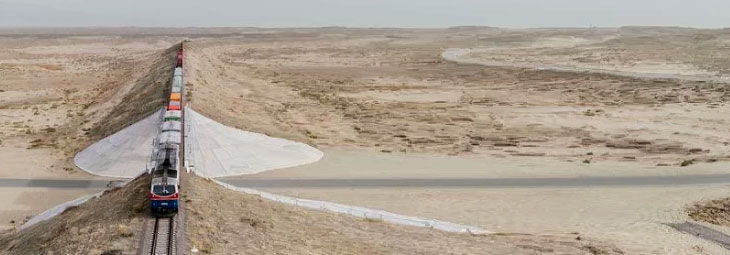
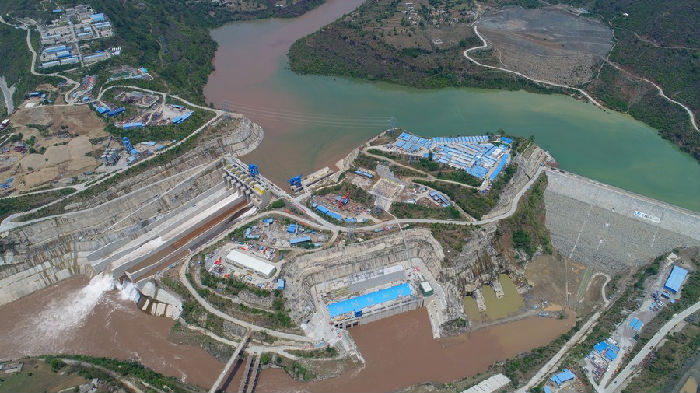
Aerial photo taken on June 22, 2022 shows a view of Karot Hydropower Plant, the first hydropower investment project under the China-Pakistan Economic Corridor. [Photo/Xinhua]
With implementation of the BRI, numerous major infrastructure projects have become operational in Africa, promoting social and economic development, changing the outlook for cities and towns, and transforming the lives of millions of people.
Changed outlook
Since the initiative was proposed by China in 2013, nearly all African countries have joined it. Worldwide, as of the end of July, 149 countries and 32 international organizations had signed more than 200 cooperation documents with China to jointly build the BRI - involving over 3,000 projects with total investment of nearly $1 trillion.
Putting the BRI into context, Chinese companies have supported African nations in constructing some 100,000 km of roads, more than 10,000 km of railways, nearly 100 ports, and numerous hospitals and schools over the past years, according to the Chinese Foreign Ministry.
In Kenya, at least 400 Chinese companies have set up subsidiaries with a key focus on infrastructure, retail and real estate, according to the Kenya National Chamber of Commerce and Industry. With help from China and other partners, Kenya has built more than 11,500 km of new paved roads, with the country's network of such roads growing by more than 85 percent in the past 10 years.
In addition to the Nairobi Expressway, the China-built and funded Mombasa-Nairobi Standard Gauge Railway celebrated its fifth anniversary in May.
The 480-km line connecting Kenya's two largest cities is a flagship BRI project and Kenya's largest infrastructure project since it gained independence in 1963. It cuts the journey time between the two cities from more than eight hours to five.
Since May 2017, when the railway opened, more than 7 million trips have been made and 19.8 million metric tons of goods have been carried along the line, according to Africa Star Railway, the operating company.
The line has become a top option among Kenyans and foreigners traveling between the coastal city of Mombasa and the capital, according to the company.
In addition, the railway generated nearly $128 million in revenue from passenger and freight services last year alone, according to the Kenya National Bureau of Statistics. It has also created thousands of jobs for locals.
Dennis Munene, executive director of the China-Africa Center at the Africa Policy Institute in Kenya, said the BRI has transformed Kenya's infrastructure development and is in line with the national strategy, Kenya's Vision 2030.
The BRI has become an inextricable part of the story of a rising Kenya and Africa, he said.
"Through the BRI in Kenya, China has supported modern infrastructure projects such as railways, expansion of roads, and construction of ports, dams, industries, digital connectivity and airports, all of which have injected vitality into Kenya's economic and development growth," Munene added.
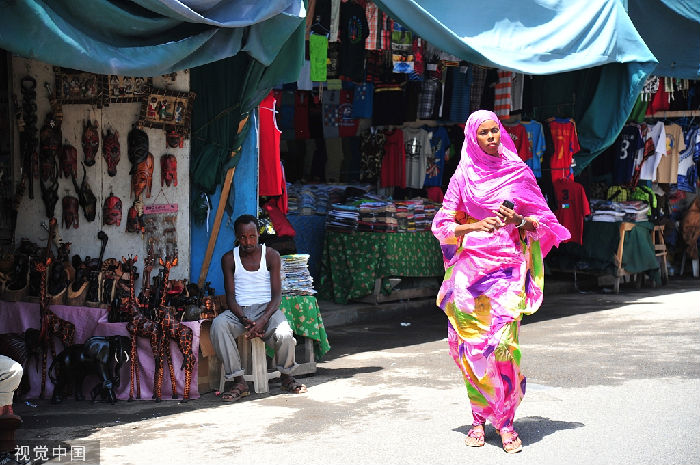
A view of Djibouti situated on the Horn of Africa. [Photo/VCG]
Major hub
In the small nation of Djibouti, situated on the Horn of Africa where the Red Sea meets the Gulf of Aden, a number of projects have been implemented in cooperation with China in recent years, helping transform the country into a key hub for trade, transportation and logistics in Africa.
Djibouti International Free Trade Zone, jointly run by the Djibouti Ports and Free Zones Authority and Chinese enterprises including Merchants Group, opened in 2018, and has attracted more than 200 companies. The facility is on its way to becoming the biggest free trade zone in Africa.
Ports play a predominant role in Djibouti's economy, accounting for more than 70 percent of its GDP. Ethiopia, its landlocked neighbor, and other countries rely heavily on Djibouti for imports and exports.
Aboubaker Hadi, chairman of the Djibouti Ports and Free Zones Authority, said the zone has significantly improved the nation's status as an important transportation hub in Africa and globally.
"We have good relations with Chinese companies, as partners and investors. We are co-financing several projects in the country, including ports, railways and free trade zones," he said. "We are achieving very good productivity all over Africa. The World Bank has ranked Djibouti 19th among container ports in the world, and first in sub-Saharan Africa."
Hu Bin, the Chinese ambassador to Djibouti, said free trade zones promote the development of value-added industries and diversify industrial development, which is why the government in Djibouti regards the zone as an extremely important platform to promote the transformation of the nation's economy.
The free trade zone has also brought business opportunities to entrepreneurs from countries in the region.
Deliah Nalukwago, a coffee producer from Uganda, said she is considering exporting coffee and related products to China via the zone.
Exporting products requires completion of numerous procedures, such as taxation, complying with logistics requirements, and conducting quality assessments, which has deterred her from turning her plans into action.
"If the free trade zone can facilitate all these, I think it will help Chinese suppliers reach the African market. It could also help African suppliers reach the Chinese market," Nalukwago said.
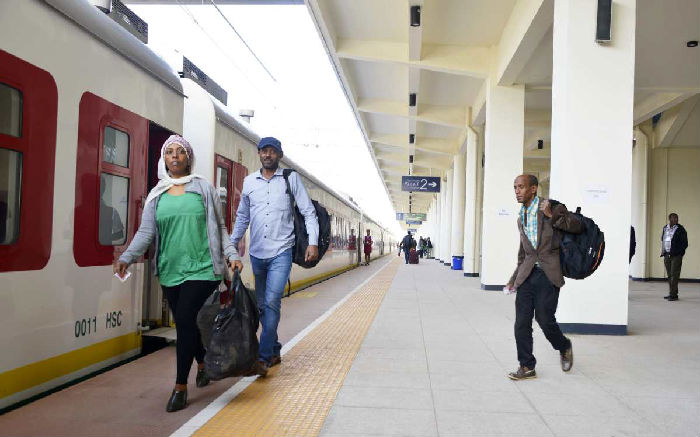
Passengers board a train on Addis Ababa-Djibouti Standard Gauge Railway in Addis Ababa, Ethiopia. [Photo/Xinhua]
Rail link thrives
Another milestone project, the 752-km Addis Ababa-Djibouti railway, which links Djibouti and the Ethiopian capital, has also helped transportation and industrialization in the two nations.
The line, which officially began operating in 2018, means that goods imported from Djibouti now arrive in Addis Ababa within a day, less than half the time taken by road. The rail freight costs are also much lower.
Several industrial parks have been built along the line. As the first cross-border electrified railway in Africa, the line is playing an increasingly important role in regional integration and economic development.
Teshome Toga, the Ethiopian ambassador to China, said, "The Belt and Road Initiative is clearly helping us in terms of infrastructure development, which means connectivity. It also enhances industrialization and boosts our exports." The envoy added that the Ethiopian government will continue to support the initiative.
"We are cooperating with China in every sector, ranging from finance to technology transfer, human resources development, trade, arts and culture. We hope bilateral cooperation will pick up," Toga said.
Port poised to open
In Nigeria, Africa's most populous country, construction of the Lekki Deep Sea Port is expected to be completed by the end of this month.
When it starts operating next year, the facility will increase Nigeria's daily port handling capacity from 3,000 containers to as many as 20,000, significantly easing congestion at the two old ports the nation currently relies on and greatly promoting the nation's international trade.
Muazu Jaji Sambo, Nigeria's transport minister, said the port, contracted to China Harbour Engineering Co, is expected to contribute more than $200 billion to government revenues and create some 16,000 jobs in coming decades.
Lauren Johnston, a senior researcher at the South African Institute of International Affairs, said the port has the potential to help Nigeria optimize the African Continental Free Trade Area, a pact connecting 1.3 billion people across the continent that the World Bank believes can transform the region's economies.
"In addition, the Lekki port is embedded in the Lekki Free Trade Zone. Offering tax and other incentives, as well as reliable and modern infrastructure, the new port will dramatically reduce the cost of shipping and could change the face of importing to and exporting from West Africa's largest economy," Johnston said in a recent commentary.

A Chinese expert checks the growth of rice with farmers in Abuja, Nigeria. Rice planted at four demonstration fields all produced good harvests this year. [Photo/CHINA DAILY]
Marked improvements
Wu Peng, head of African affairs at the Chinese Foreign Ministry, said that as part of the BRI, cooperation projects such as roads, ports, power and telecommunication facilities have been put into operation throughout Africa, significantly improving the continent's ability to achieve sustainable development.
China will continue to align the BRI and the Global Development Initiative, which it also proposed, closely with the development strategies of African countries. It will also expand Sino-African cooperation to new sectors such as green development and the digital economy to bring about joint prosperity, he said.
Toga, the Ethiopian ambassador, said that as a global initiative, the BRI should be financed in a more diverse way for sustainability.
"These are huge infrastructure projects, and they cost a lot of money," he said. "China shouldn't be the only source of finance. The private sector in Africa, and all over the world where the BRI is in operation, could be one such source."
He added that harmonization of policies and legal frameworks among countries taking part in the BRI is also needed, as a single project could involve several nations.
Source: <https://www.chinadaily.com.cn/a/202210/21/WS6351d539a310fd2b29e7dab6.html>